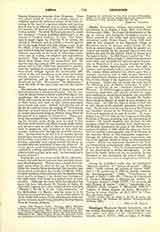

Denzinger, HEINRICH JOSEPH DOMINICUS, one of the leading theologians of the modern Catholic German school and author of the “Enchiridion” universally used, b. October 10, 1819, at Liege; d. June 19, 1883, at Wurzburg. In 1831 his father, who was a professor at the Liege University, took him to Wurzburg, the original home of the family. Here he attended the gymnasium and studied philosophy at the university, where he received the Ph. D. degree. In 1838 he entered the Wurzburg seminary, went to the German College at Rome in 1841, was ordained priest in 1844, and the following year took a degree in theology. On his return home he was first curate at Hassfurt-on-the-Main, became professor extraordinary of dogmatic theology at Wurzburg in 1848, and ordinary professor in 1854. He continued to occupy this position, in spite of ill-health, till his death. Denzinger was one of the pioneers of positive theology and historical dogmatic (Dogmengeschichte) in Catholic Germany. In the generation after Johann Adam Mohler (d. 1838) and Dollinger (1799-1890) he carried on their methods and helped to establish what is the special character of the German school, exact investigation of the historical development of theology, rather than philosophical speculation about the corollaries of dogma. Nearly all his important works are in the nature of historic theology. The best-known and most useful is his “Enchiridion Symbolorum et Definitionum” (first ed., Wurzburg, 1854), a handbook containing a collection of the chief decrees and definitions of councils, list of condemned propositions, etc., beginning with the oldest forms of the Apostles’ Creed. It has often been republished, with considerable additions, of which the most important are part of the Bull defining the Immaculate Conception (Ineffabilis Deus, 1854), the Syllabus of 1864, and the Vatican decrees. After Denzinger’s death Professor Ignatius Stahl continued the work of reediting the “Enchiridion” with additional decrees of Leo XIII. A revised and enlarged edition (10th ed., Freiburg, 1908), prepared by Clemens Bannwart, S.J., includes decrees of Pius X. Other works are “Ritus Orientalium, Coptorum, Syrorum et Armenorum” (2 vols., Wurzburg, 1863-1864), a long treatise on Eastern rites; “Vier Bucher von der religiosen Erkenntniss” (2 vols., Wurzburg, 1856-1857), “Ueber die Aechtheit des bisherigen Textes der Ignatianischen Briefe” (Wurzburg, 1849), “Die spekulative Theologie Giinthers” (Wurzburg, 1853). He also wrote a number of shorter treatises, on Philo Judaeus (1840, his first work), on the Immaculate Conception (1855), and papal infallibility (1870). At the time of his death he was preparing a complete compendium of dogmatic theology. He edited a number of medieval theological works: Habert, “Theologia Graecorum Patrum vindicata circa materiam gratise” (1853); De Rubeis, “De peccato originali”, (1857); P. Marani, “Divinitas D. N. Jesu Christi” (1859). He was appointed a consultor of Propaganda for Eastern rites in 1866.
ADRIAN FORTESCUE

